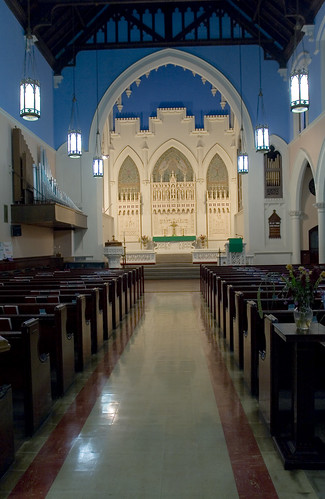Earlier this week, the bishops came to town.
The bishops represented four specific synods (and four larger regions) of the ELCA and came to interview seniors, meet with seminarians, and try to explain the “draft” in no-anxiety inducing ways. As a junior, many of the topics covered did not pertain to me but I did love hearing about the draft. Okay okay, the bishops do not like to call it a “draft” but it’s the only word that students use. The draft is really the assignment process – the process how seminarians are assigned to synods across the ELCA. Seminarians call it the draft in honor of the NFL draft (not the military draft I think). The anxiety inducing images are groups of bishops meeting at the churchwide offices in Chicago, putting all the available seminarians on a wall, and then haggling over them. I think the room is also suppose to be covered entirely in velvet and the walls resemble the billiard hall for landed gentry in the late 1800s. In the smoke filled room, students are traded for, against, and decisions are made. I never really thought this was a valid interpretation of the draft because if it really was a draft, I would like a signing bonus. And having Chris Berman narrating the event, going over our statistics, and describing how fast we can run the 40 yard dash, would be fantastic.
My bishop came down to visit and I had lunch with him and met up with him in a small group discussion. I also met with the bishop from the Northern Texas – Northern Louisiana Synod. Both discussions went really well and I asked quite a bit about the opportunities for latino pastors and whether latino pastors would end up being placed into only specific congregations (as the former head of a call committee, I am very familiar with the ways committees can reject candidates). Would I really only find a call in a multi-ethnic congregation, a hispanic congregation (even though I currently do not speak spanish), or would my opportunities to receive a first call be larger than that? I’m curious because I know that I will be restricted on where I will end up (sorry North Dakota! /sarcasm) and I really would like to not sit around for five years waiting to be called (though a bishop that visited did wait 5 years until his first call). I was told that I really should learn Spanish (the growth in the ELCA for a lot of congregations is among hispanics) but that I won’t be smacked into a narrow demographic when it comes to first call opportunities.
Though what first call opportunities will be there, the bishops were frank that the church is in a strange boat right now. Many churches cannot afford a full time pastor and many new models are being thought about to merge congregations or to create multi-point parishes were one pastor serves multiple churches. Whenever I heard the bishops talk like this, I think about the early Lutheran church in the United States which was served by many pastors who spent most of their time on horseback. I’ve only been horseback riding once and I remember being young and pleading with the horse, several times, to not jump because I was afraid I was going to fall off all the time. I was about ten years old and the horse had a sense of humor. And by sense of humor, I mean that the horse liked to messed with me because it would stop at ditches, pretend that it was going to jump across, and then walk over. That’s anxiety inducing right there. I hope the horses that served the frontier weren’t smartalecks too.
Besides the attempts to dissuade our fear of where we will eventually end up to do ministry, I enjoyed the bishops’ visit. I wish more had been able to make it and I think it’s very fitting that the bishop from New York is as towering figure as he is. For the city of skyscrapers, that just seems to make sense.
